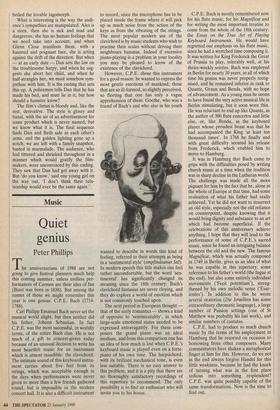Music
Quiet genius
Peter Phillips
The anniversarians of 1988 are not going to give festival planners much help this coming summer, unless endless per- formances of Carmen are their idea of fun (Bizet was born in 1838). But among the names of those we might remember this year is one genius: C.P.E. Bach (1714- 1788).
Carl Philipp Emanuel Bach never set the musical world alight, but then neither did his father, Johann Sebastian. In fact C.P.E. was the most successful, in worldly terms, of the entire Bach clan. He is not much of a gift to concert-givers today because of an unusual decision to write his most heartfelt music for an instrument which is almost inaudible: the clavichord. The intimate sound of this keyboard instru- ment carries about five , feet from its strings, which was acceptable enough in the days when performances were never given to more than a few friends gathered round, but is impossible in the modern concert hall. It is also a difficult instrument to record, since the microphone has to be placed inside the frame where it will pick up as much noise from the action of the keys as from the vibrating of the strings. The most popular modern use of the clavichord is by music students who wish to practise their scales without driving their neighbours bananas. Indeed if excessive piano-playing is a problem in your locality you may be pleased to know of the existence of the clavichord.
However, C.P.E. chose this instrument for a good reason: he wanted to express the most gentle emotions of mankind; those that are so ill-formed, so slightly perceived, so fleeting that one has only a vague apprehension of them. Goethe, who was a friend of Bach's and who also in his youth wanted to describe in words this kind of feeling, referred to their attempts as being in a 'sentimental style' (empfindsamer Stil). In modern speech this title makes one feel rather uncomfortable, but the word 'sen- timental' has significantly changed its meaning since the 18th century: Bach's clavichord fantasias are never cloying, and they do explore a world of emotion which is not commonly touched upon.
The next period in European thought that of the early romantics — shows a kind of opposite to 'sentimentality', in which large-scale emotional states needed to be expressed extravagantly. For these com- posers the grand piano was an ideal medium, and from this comparison one has an idea of how much is lost when C.P.E.'s keyboard music is played even on a forte- piano of his own time. The harpsichord, with its brilliant mechanical tone, is even less suitable. There is no easy answer to this problem, and it is a pity that there are no thoroughly satisfactory recordings of this repertory to recommend. The only possibility is to find an enthusiast who will invite you to his house. C.P.E. Bach is mostly remembered now for his flute music, for his Magnificat and for writing the most important treatise to come from the whole of the 18th century: the Essay on the True Art of Playing Keyboard Instruments. He would have regretted our emphasis on his flute music, since he had a wretched time composing it.
It was written for King Frederick the Great of Prussia to play, tolerably well, at his thrice-weekly soirees. Bach was employed in Berlin for nearly 30 years, in all of which time his genius was never properly recog- nised, and he remained inferior in rank to Quantz, Graun and Benda, with no hope of advancement. As a young man he seems to have found the very active musical life in Berlin stimulating, but it soon wore thin. He was reluctant to end up like Quantz, as the author of 300 flute concertos and little else, or, like Benda, as the keyboard player whose proudest boast was that he had accompanied the King 'at least ten thousand times'. In 1768 he finally and with great difficulty secured his release from Frederick, which enabled him to move to Hamburg.
It was in Hamburg that Bach came to grips with the difficulties posed by writing church music at a time when the tradition was in sharp decline in the Lutheran world. The challenge was made all the more piquant for him by the fact that he, alone in the whole of Europe at that time, had some realisation of what his father had really achieved. Yet he did not want to resurrect an old style, especially not the old reliance on counterpoint, despite knowing that it would bring dignity and substance to an art which had become superficial. If the celebrations of this anniversary achieve anything, I hope that they will lead to the performance of some of C.P.E.'s sacred music, since he found an intriguing balance between the old and the new. The famous Magnificat, which was actually composed in 1749 in Berlin, gives us an idea of what he was capable in this repertory: some reference to his father's world (the fugue at the end), but also some entirely individual movements CFecit potentiam'), streng- thened by his own melodic sense (`Esur- ientes'). In addition to this he wrote several oratorios (Die Israeliten has some extraordinary chromatic language), a large number of Passion settings (one of St Matthew was probably his last work), and similar numbers of cantatas.
C.P.E. had to produce so much church music by the terms of his employment in Hamburg that he resorted on occasion to borrowing from other composers. Many commentators have shaken a metaphorical finger at him for this. However, do we not in the end always forgive Handel for this little weakness, because he had the knack of turning what was in the first place tedious into something resplendent? C.P.E. was quite possibly capable of the same transformations. Now is the time to find out.


























































 Previous page
Previous page